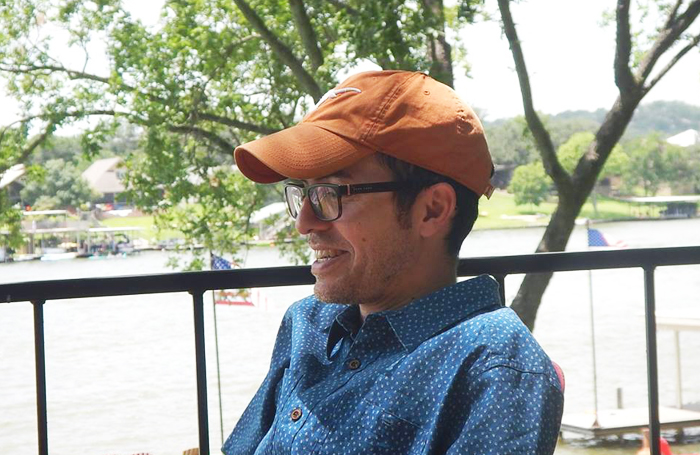
Oliver Bernstein in Kingsland, Texas.
On August 28, lifelong environmental activist and former Sierra Club staffer Oliver Bernstein was appointed to the Club’s Board of Directors to fill the vacancy created by the departure of Director Chuck Frank. He will serve out the remainder of Frank’s term until the May 2019 Sierra Club elections.
Born and raised in Miami, Bernstein holds a B.A. in comparative literature from Dartmouth College with a minor in environmental policy. He completed a postgraduate fellowship in Mexico City studying air pollution programs, and served for six years as a board member at American Gateways, a Texas non-profit that provides immigration education and legal services to help secure justice for new Americans.
Bernstein was the Sierra Club’s U.S./Mexico border representative from 2004-2006; deputy national press secretary for diversity programs from 2006-2009; and communications strategist from 2009-2014.
For the last four years he has worked as communications director at the Center for Public Policy Priorities (CPPP) in Austin, where he lives with his wife, Corrie MacLaggan, and their two children, Carmen (age 7) and Leo (age 4).
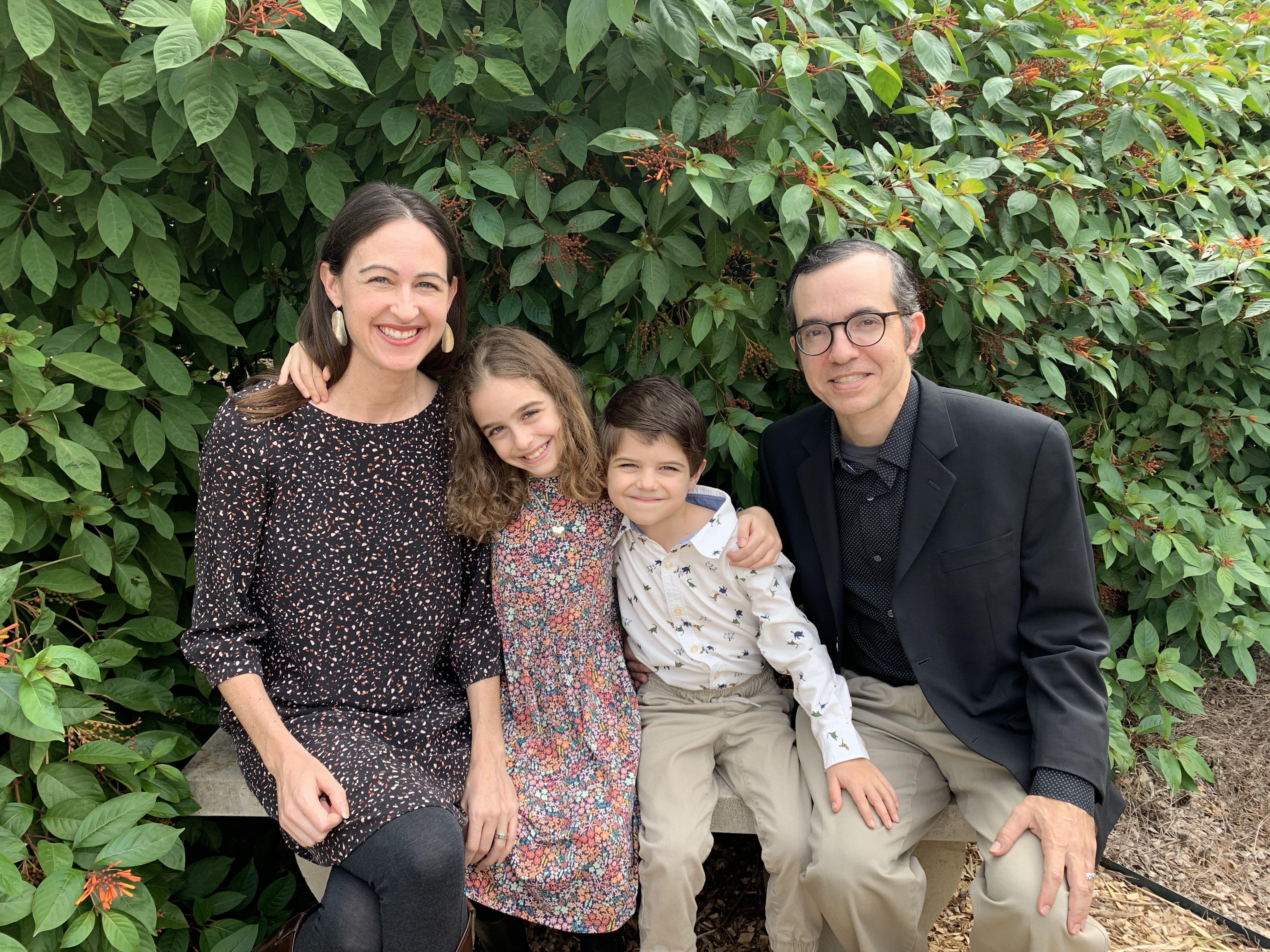 Corrie, Carmen, Leo, and Oliver
Corrie, Carmen, Leo, and Oliver
The Planet spoke with Bernstein the week after he was appointed to the Board of Directors.
Planet: I understand you joined the Sierra Club when you were 12 years old.
Bernstein: Yes, and the Club has been my home ever since.
Planet: What was it that kindled your interest in the environment at such a young age? Were your parents Sierra Club members? Would you say they were environmentalists?
Bernstein: My first exposure to Sierra Club was through a beloved middle-school teacher, Genevieve Gillen. She taught all of her public school students to value the environment, and we learned about some of the leading organizations working to protect our air, water, wildlife, and people. Then in high school I got much more active.
Planet: In 1999 you moved north 1,500 miles, from South Florida to New Hampshire, to attend college. Tell me about that.
Bernstein: Dartmouth is a beautiful place, and the Appalachian Trail runs right through the heart of campus. It was a tremendous privilege to study there and spend so much time outdoors. I had never lived anywhere that cold, but I got into snowshoeing and learned how to keep warm. I was a coxswain (the person who steers and leads the team) on the Varsity men’s rowing team, so I spent plenty of time on the chilly Connecticut River. Dartmouth had some innovative environmental programs, and it also hosted presidential candidates in town for the New Hampshire primaries. I once handed then-candidate Al Gore a VHS video about pollution in the Everglades, asking him to help protect clean water flows to my hometown national park. He was nice about it, but the Secret Service didn’t appreciate me handing him something directly!
Planet: And after graduating from Dartmouth you moved straight to Mexico City?
Bernstein: I spent a summer in El Paso first, interning with the Environmental Defense Fund there and learning about air pollution. It’s a fascinating place. The airshed is shared by three states (Texas, New Mexico, and Chihuahua, Mexico) and two countries, so figuring out policies to protect the air and people can be tricky. I got to use my Spanish there extensively. Then in Mexico City I worked with a great little nonprofit research center that was using real-time air quality monitoring software to fight pollution and corruption at the same time. By taking air pollution data directly from sensors and putting it on the internet for everyone to see, the group was preventing public officials from tampering with the numbers for political purposes.
Planet: How old were you when you became the Sierra Club’s U.S./Mexico border representative?
Bernstein: I was almost 24 when I joined the staff. Based in Austin, I spent much of my time on the road, visiting Sierra Club members along the border in Texas, New Mexico, Arizona, and California. And I went across the border often, visiting small grassroots groups that were funded by a Sierra Club’s now-defunct Beyond the Borders program. We had a program officer in D.C., and I was the organizer on the ground.
Planet: Were you already fluent in Spanish when you took the job?
Bernstein: Yes, I learned Spanish back in Miami starting in third grade in a terrific bilingual school. My daughter is in a similar program now, and they start even younger. Every job I’ve ever had has required or at least harnessed the ability to speak Spanish.
Planet: What were the big border issues in 1999? NAFTA had been in place for five years at the time, I believe.
Bernstein: The border work stemmed from the impacts of NAFTA on the people of the border. There were tragic cases of kids who got toxic burns from stepping into puddles of waste that came from factories built after NAFTA went into effect. Trade issues generate plenty of controversy, of course, but on the ground it was just local residents dealing with all the change and wanting what was best for their communities. I was invited by local okra farmers in Mexico to help them stop a proposed waste transfer facility that a company wanted to build in the middle of their okra fields. Sierra Club members will recognize the work we did together as community organizing, power mapping, and leading from behind.
Planet: How did growing up in Miami inform your interests, pursuits, and career path?
Bernstein: I grew up focused on water sports in Miami, so I got an early appreciation for water quality. There were also some local politicians around that time who were more interested in cutting deals than protecting our natural environment. That got me mad, and I channeled that anger into organizing other students. Miami is also a very international city and a place where immigrants powered the local economy.
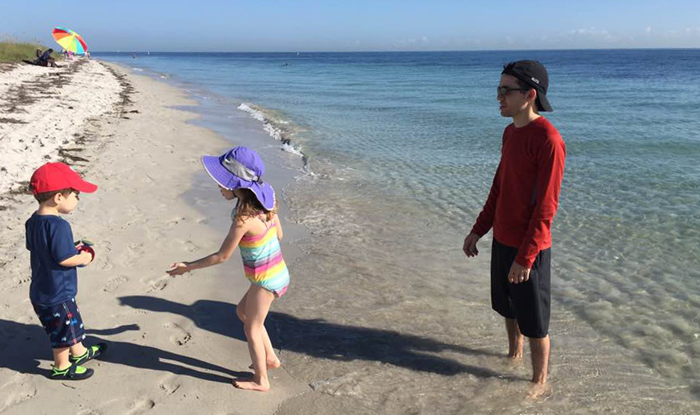
Leo, Carmen, and Oliver at the beach in Miami.
Planet: What prompted your move to Austin?
Bernstein: My first job at the Sierra Club was based in Austin, and I got to work with some fantastic organizers. It was fascinating to go from Sierra Club volunteer to staff member, and I always have tried to maintain a balance in my approach to the work. During college I met my now-wife, who is an Austin native, and we were excited to live in Austin. I enjoy it here, though it has its challenges in terms of affordability, race equity, transportation, and environmental injustice. The Austin Group of the Sierra Club is formidable, vigilant, and a local force to be reckoned with.
Planet: You were on the national Sierra Club’s staff for just shy of a decade. Can you very briefly recap your experience here? What were the main issues you worked on?
Bernstein: I had several different roles on the staff. As an organizer, I learned the craft that generations of Sierra Club volunteers and staff members have honed. I was part of a large team of people that helped put the nails in the coffin of the Asarco copper smelter in El Paso, which had a legacy of lead pollution. I got to work with some of the Club’s most dedicated and amazing environmental justice organizers in places like Detroit, New Orleans, Memphis, and Appalachia. What I found through organizing was that media and communications were powerful tools for reaching large audiences, and I enjoyed that. When a job opened up overseeing “diversity media” for the national organization, I jumped at it. There I got to think about ways to share stories of Sierrans and other community members with Hispanic media outlets, African American media, Asian American media, and Native American media.
Planet: In what ways did the Club evolve during your tenure here?
Bernstein: I was part of a little staff team dubbed the “Change Team,” led by the remarkable and sorely missed Greg Haegele. I was asked to think about ways to improve internal communication at the Club, so that volunteers at all levels, chapter staff, national staff and others, could stay connected. It’s important work that is still in progress, but I’m proud of projects from those days that live on, like the Hitched e-newsletter, the staff organizational chart, and more. I was also around for the launch of the Beyond Coal campaign, which has been such a powerful force for change. The high-profile campaign brought its own growing pains to the organization, but I was thrilled to manage a team of press secretaries and communications professionals who were so amazingly good at what they did. But many of the Club’s core focus areas -- getting people outdoors, teaching them what’s at stake, organizing, and building power -- have persisted.
Planet: In 2014 you went to work for the Center for Public Policy Priorities. Have you remained active as a Sierra Club volunteer? In what ways do you think the Club has evolved or changed since you left its employ?
Bernstein: After nearly 10 years on staff at Sierra Club, I wanted to focus more on Texas. I live here and am raising my kids here, and this great state has some big challenges.
Planet: Tell me about the CPPP and what you do there.
Bernstein: At the Center for Public Policy Priorities, we believe in a Texas that offers everyone the chance to compete and succeed in life. We envision a Texas where everyone is healthy, well-educated, and financially secure. We want the best Texas -- a proud state that sets the bar nationally by expanding opportunity for all.
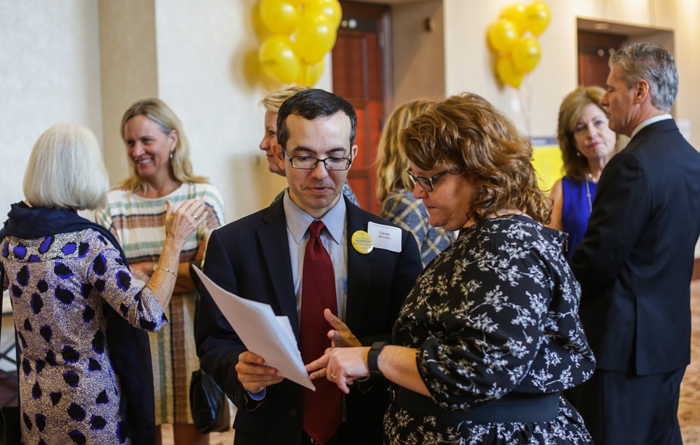
Fundraising event at the Center for Public Policy Priorities
As an independent public policy organization, we use data and analysis to advocate for solutions that enable Texans of all backgrounds to reach their full potential. I spend my time getting the analysis and policy solutions from my expert colleagues into the most compelling formats and out to the right people. In the age of “alternative facts” and “fake news” it is challenging but invigorating to work at a place that values data and facts.
Planet: What prompted you to run for the Sierra Club’s board of directors?
Bernstein: The Sierra Club lit my passion for protecting our air, water, land, and people over 25 years ago, and I owe much of who I am to this organization. Growing up in Miami, I learned from the local Club about a proposal to build a destructive airport near the Everglades. I led a postcard campaign against the airport and rallied students -- first in high school and later at Dartmouth College. Standing up for our environment and bringing others with me helped defeat the airport, and I was hooked on both activism and the Club.
Today, the effects of climate disruption and the recklessness of the Trump administration compel me to step up and lead. I've dedicated most of my life to environmental and social justice, and reflecting on my path, the Club has always been my home.
Planet: What was the platform on which you ran for the BOD?
Bernstein: For now I have been appointed through May 2019, and I hope to do plenty of listening and support the other directors in guiding this venerable organization. I am still interested in enhancing internal communications, and I hope to bring my experience in various roles at the Sierra Club to my board service. I am excited about the Club’s equity and inclusion work, and of course I am fired up to support those who are resisting the dangerous policies of the Trump administration.
Planet: What are the biggest environmental challenges the United States faces today? What are the biggest environmental challenges the world faces today?
Bernstein: It's hard to look beyond the immediate threats that Trump, Andrew Wheeler, Ryan Zinke, and others in this administration pose to the environment. These zealots have started the rollback of many of the bedrock air, water, land, and climate protections in America. The Sierra Club is responsible for many of those safeguards, some of which I helped push for as a staff member. While we resist the Trump agenda, we must keep supporting clean energy, going after polluters, and working to get the next generation of activists elected and outdoors -- not necessarily in that order.
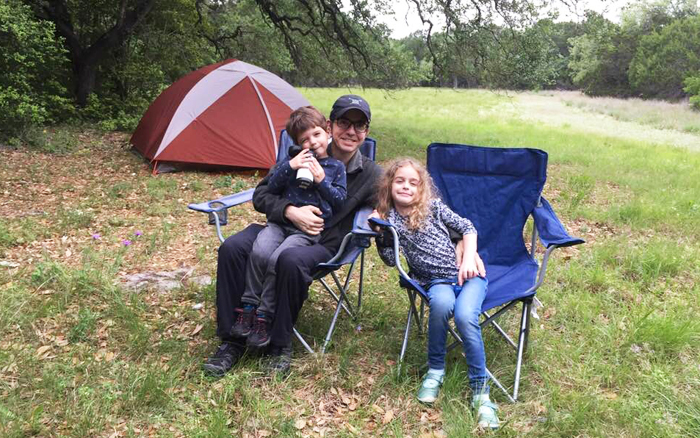
Camping with the kids in Driftwood, Texas, outside Austin.
More broadly, the effects of climate disruption on people and the natural world are really the most important environmental challenges we face today. As a father, I worry about the warming planet my kids and grandkids will inherit. As a Texas resident, I see droughts, floods, and fires becoming more common. And as a Miami native, I can't return home without thinking about rising sea levels. Just as important as the natural world are the people of color and low-income communities that bear a disproportionate burden from climate disruption.
Planet: How do you think the Sierra Club can be most effective and successful in its fight to curb climate disruption? What sort of role do you see the Club playing?
Bernstein: Over its 125 years, the Sierra Club has always been changing and evolving. John Muir wouldn’t recognize the powerhouse organization the Club has become today, and there's nothing wrong with that. The Club has evolved to be more inclusive, more nimble, and bolder. The volunteer networks and staff have scaled up to meet the enormous challenges we face.
With the clock running in the race to slow the effects of climate disruption and the Trump administration racing in the wrong direction to roll back environmental protections, the Club is more important than ever. We need to be strong enough and bring enough people along with us in the fight while remaining true to our core principles and vision. We know what works -- true grassroots organizing, making people feel welcome and included, getting people outdoors, and hiring the best people and treating them well.
Trump's devastating policies are grave threats to everything the Club represents. Concerned Americans' desire to resist presents a huge opportunity and responsibility for the Club. The unstoppable momentum from the clean energy marketplace and international leadership are good signs.
Planet: Are you optimistic about our society’s chances of correcting course and seriously addressing the climate issue?
Bernstein: I am optimistic about our chances, and I know it will take enormous energy from the Sierra Club and our partners to get us on a sustainable path.
Planet: What advice would you have for young people who want to get active and involved in the environmental/progressive movement?
Bernstein: There is so much more technology now and so many ways to get involved in causes that young people are passionate about. When I joined the Club, most of what we did was through letters and snail mail. Now there are apps that can connect you with other interested people nearby and fantastic trainings like the one conducted by the Sierra Student Coalition to get you engaged. Just dive in -- and bring some friends with you!